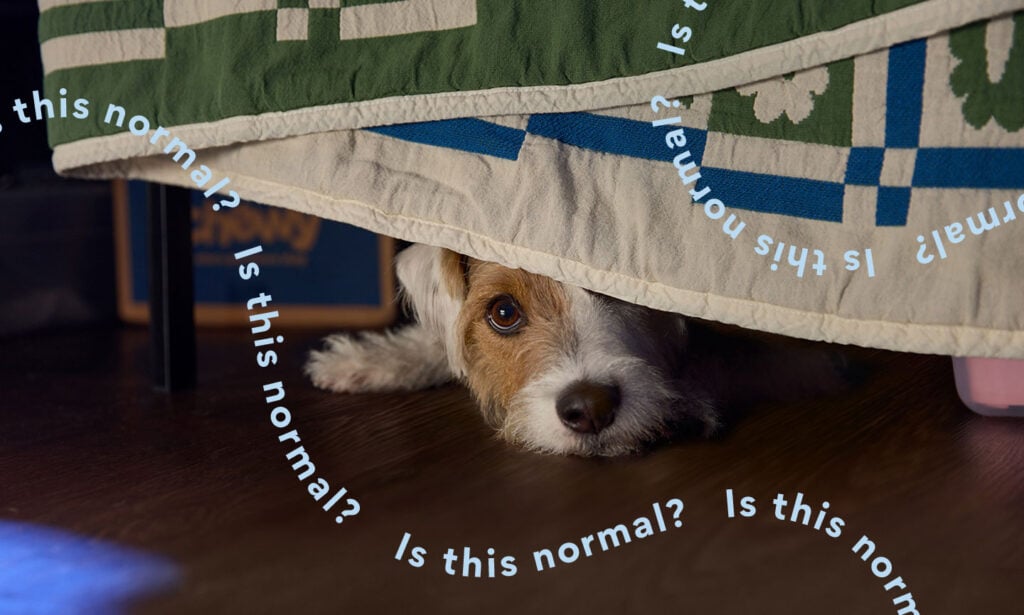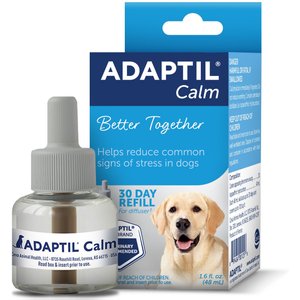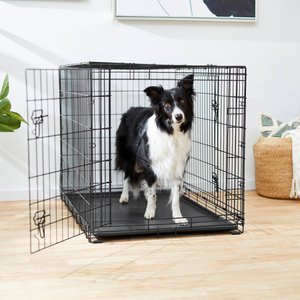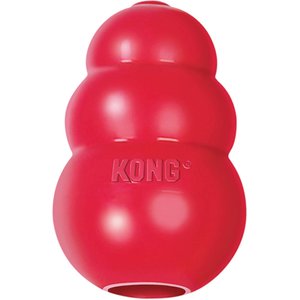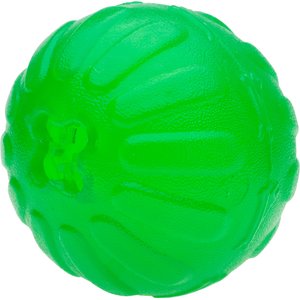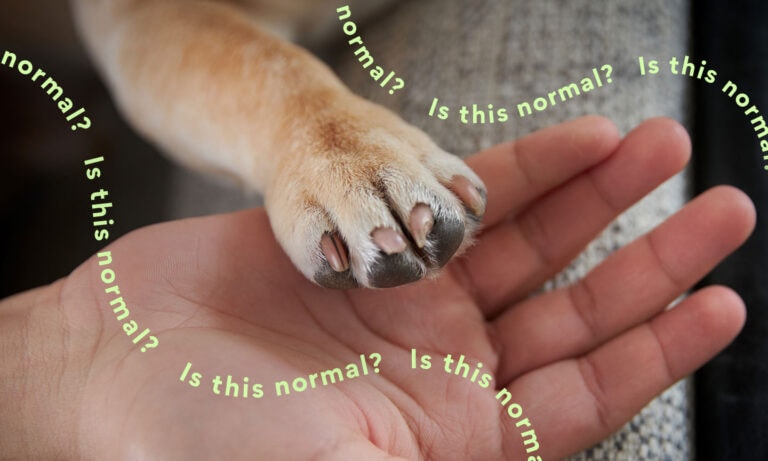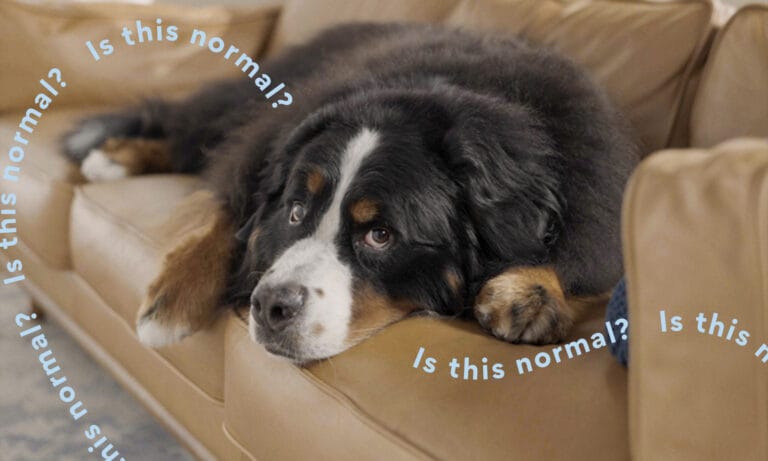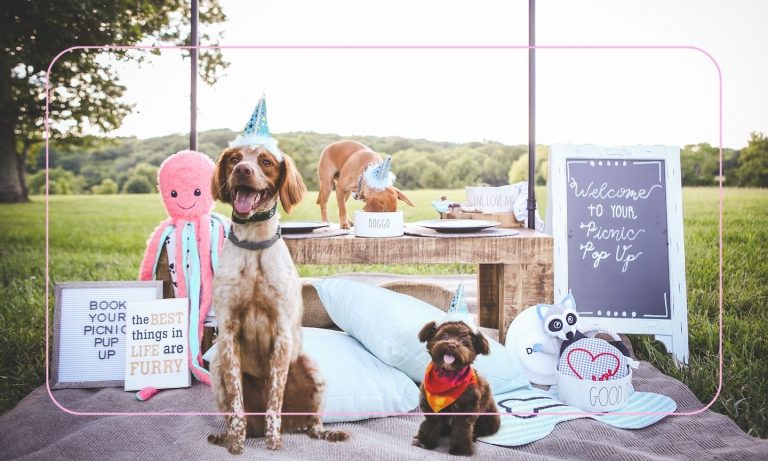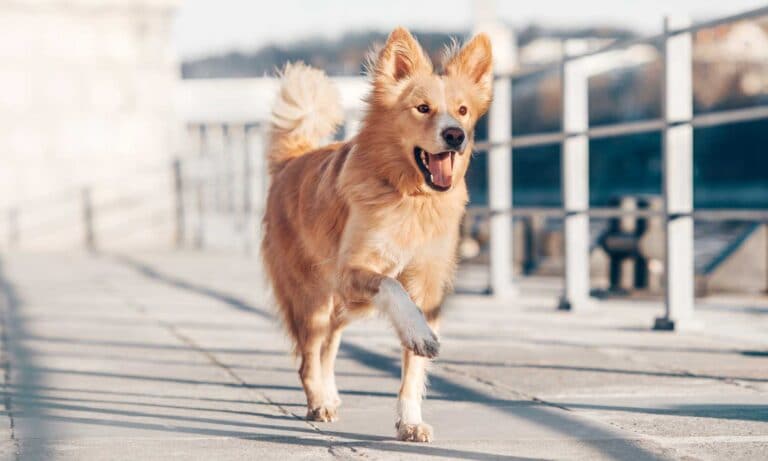Q:Whenever there’s a block party in my neighborhood with fireworks, my dogs freak out as soon as they hear them. It’s so pitiful to watch them hide and whine! Why are dogs scared of fireworks, and how can I help my pups overcome this fear?
A: The loud booms of fireworks can be really scary for our four-legged friends. The good news? There’s plenty you can do to help keep your dogs calm, including some expert-approved techniques that will help your dogs cope better come Fourth of July or New Years Eve.
Why Are Dogs Afraid of Fireworks?
They’re unexpected and loud.
It’s likely that your dog feels startled or nervous around new sounds—just like you would if you heard a loud alarm go off in your house without any warning.
“As humans, we understand and expect the annual tradition of fireworks, particularly around the 4th of July, but this concept is foreign to our dogs, and many are genuinely frightened if they are suddenly exposed to the loud sounds and scary sights associated with fireworks,” says Dr. Sandra Mitchell, DVM, DABVP, a veterinarian at Animal Medical Associates in Saco, Maine.
Dogs’ ears are sensitive.
Dogs have much more acute and sensitive hearing than humans do, so the sound of fireworks (or loud noises of any kind) can be really unnerving to them, says Dr. Amy Tate, DVM, co-owner and managing partner of Riverview Animal Clinic in Birmingham, Alabama. Fun fact: Humans can only hear between 64-23,000 Hz, whereas dogs can hear a range of 67-45,000 Hz.
Dr. Tate adds that many dogs have a fear of fireworks because they “do not know where the noises are coming from or when they will end.”
It’s part of their DNA.
If your dog gets anxious when they hear the sound of fireworks, thunderstorms or other loud noises, you can blame their natural flight or fight response.
“Many behaviorally healthy dogs find [fireworks] unpleasant, and it comes from a lack of security, meaning the dog doesn’t feel safe,” says Jolene Short, CDBC, CPDT-KA, CSAT, FFCP, a dog trainer at Homeward Bound Animal Behavior & Training in Pardeeville, Wisconsin.
The word “safety” can be somewhat subjective here. Even if your pup is tucked in their safe space (like a crate or plush bed) far away from fireworks, “perception is as good as reality when their flight or flight system kicks in,” according to Short.
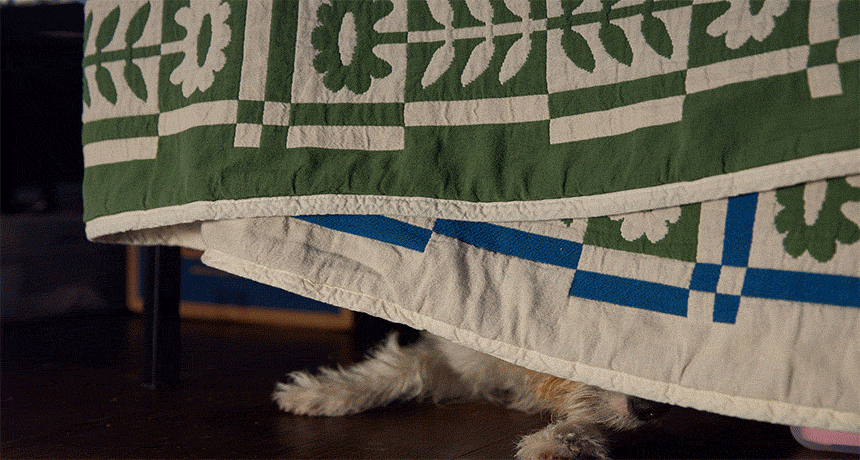
Translation? Firework-like sounds in the wild could spell danger (think: a thunderstorm, earthquake or tree falling down), so even if your dog has been an indoor pet their entire life, they may still associate these booms or loud noises with scary and potentially life-threatening events.
Is It Normal for a Dog to Be Scared of Fireworks?
As mentioned above, it’s normal for even behaviorally healthy dogs to have a fear of fireworks. However, some dogs might need a little extra TLC when it comes to managing their reaction around fireworks.
The following dogs may be more sensitive to loud noises and vibrations, according to Dr. Tate:
- Young puppies who are not well socialized or who’ve yet to be socialized
- Dogs who’ve had a traumatic experience around unexpected noises
- Dogs with vision loss
- Dogs with separation anxiety
- Dogs who are sick or in pain
Dogs who exhibit the following severe fear responses when they hear fireworks may have anxiety, noise phobias or other behavioral issues:
- Cowering
- Having potty accidents in the house
- Hiding
- Crying
- Shaking
After ruling out any underlying health issues with your vet, these issues can be addressed with a veterinary behaviorist.
How Can You Help Alleviate Your Dog’s Fear of Fireworks?
There are several great techniques to reduce your dog’s firework anxiety, according to our experts.
Desensitize them to firework sounds well in advance.
If you know that there will be fireworks in your neighborhood (say, on the 4th of July or New Year’s Eve), Short recommends trying out sound desensitization with your dog in the weeks leading up to it—especially if your dog hasn't experienced fireworks before.
This will involve playing firework sounds for them and gradually increasing the volume while providing high-value treats, their favorite toy, or fun activities to keep the exercise pleasant and foster positive associations.
“There are some pretty great things, like CDs that have been created with gradually increasing volume of firework sounds that you can try to use beforehand,” Short says. There are also free YouTube videos, or you can ask your Alexa or Google to play fireworks noises and slowly increase the volume.
Note: Short does not recommend this tactic if your dog already has a negative association to fireworks. Deliberately exposing your dog to what they’re afraid of is called flooding and Short says it isn't a terribly effective way of changing behavior—“much like shoving me in a room full of tarantulas and locking the door isn't likely to make me feel less scared of spiders.”
Tire your pup out before an evening of fireworks.
Take your pup on a long walk, go for a hike, or treat them to a puppy play date ahead of time. Adequate exercise can help reduce anxiety.
Get more advice on reducing stress here.
Try a calming aid.
Over-the-counter calming aids can help relieve stress. Such aids include:
- A comfort vest, such as a Thundershirt, that applies soothing pressure.
- A pheromone spray, diffuser or collar that mimics the scent of a mama dog's natural pheromones
- Calming treats or chews that include calming ingredients like lavender, chamomile and L-tryptophan.
See what calming aids Chewy customers use and recommend.
Create a safe space.
Prepare a calming retreat for your fearful dog, like a kennel, room or closet where they can hide. Make it extra comfy with all of their favorite things, like a blanket, bed and toys. Play brown noise or calming music, to help camouflage loud noises.
Get four ideas for creating a Zen space for your dog.
Give them a task to keep them busy.
An easy way to soothe stressed dogs is to give them something else to focus on and occupy their time. For example, freeze a KONG chew toy with peanut butter, yogurt or wet food inside and let them lick up the frozen treat. You could also try a treat-dispensing toy or a food puzzle for distraction and mental stimulation.
Leave town.
It’s likely that whatever you go on the Fourth of July or New Year’s Eve there will be loud fireworks. However, not all towns hold firework displays on the same day. And, of course, there are other times of year that fireworks may be used. If you can, go for a long car ride to escape all the action.
Ask your vet about prescription medication.
If you’ve tried other techniques without any success, it may be time to talk to your vet about prescription medication you can use during these stressful situations.
“Prescription anxiety medication is a completely reasonable and humane way to help your dog through a tough time,” Short says. “In many circumstances it is meant to be paired with behavior modification, since it is not a magic wand by itself.”
How to Keep Your Dog Safe Around Fireworks
All of our experts want pet parents to know that fireworks are extremely dangerous to dogs. Even if they seem to be tolerant of the sights and sounds, your dog can easily become panicked and run away and/or injure themselves or others.
“I cannot tell you how many dogs have surprised their owner by escaping, and that is such a stressful experience that could have devastating consequences,” Short says. “The 5th of July is one of the busiest days of the year for shelters across the country for a reason.”
To keep them safe:
- Stay at home
- Keep them crated (if your dog is already crate trained) or confined to a room
- If you must go out, keep them leashed at all times
- Make sure ID tags and microchip contact info are up to date
Keep Calm and Carry On
It can be heartbreaking to see your beloved fur baby so stressed over fireworks—and somewhat overwhelming to find the best solution. Be prepared for some trial and error and know that one size does not fit all.
“I have one dog that does great with a [body] wrap, an Adaptil diffuser, and an anxiety medication. It changes him from a dog who is panicked to one who can lay down and rest,” Short says. “I had another dog who did great with a cozy bed placed inside of a little kid's play tent so he could ‘escape.’”
Together with your vet, you can help your pet find calm amongst the ka-boom. For more expert advice, check out our guide on how to mitigate stress in pets.
Get more stress-busting advice:
Share:
